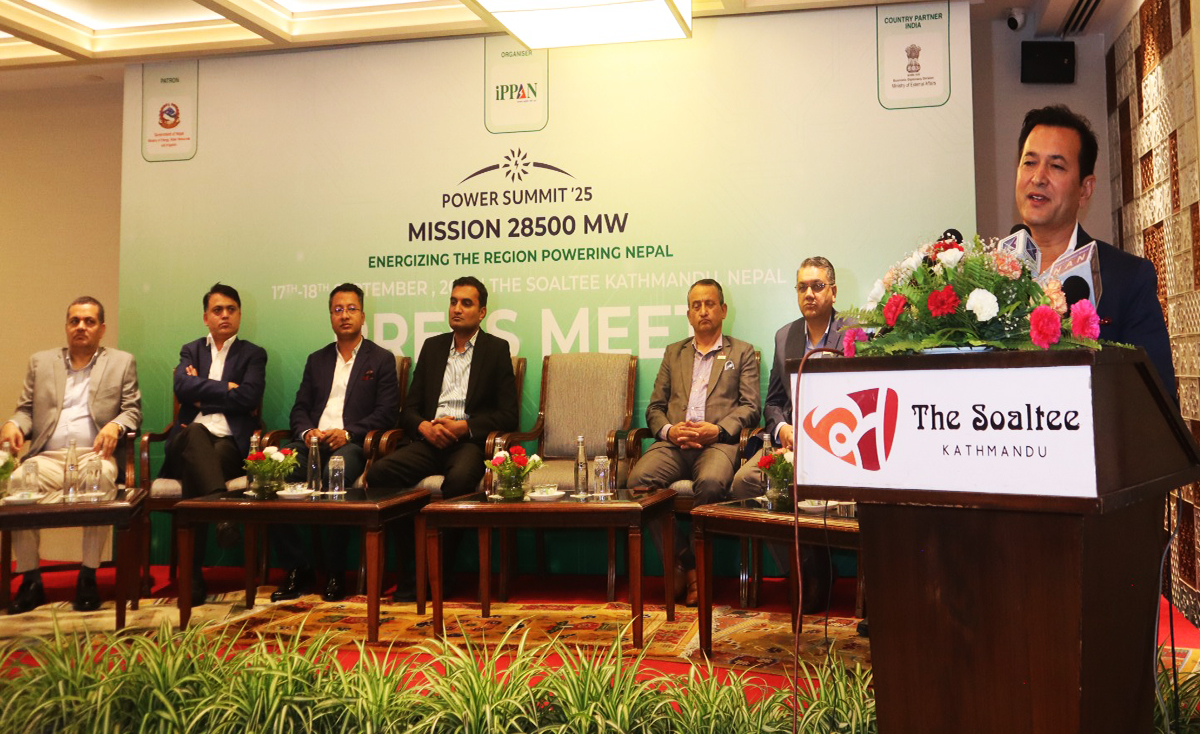
Kathmandu: The Independent Power Producers' Association, Nepal (IPPAN) is set to organize the Power Summit 2025 on September 17–18, 2025 (Ashoj 1 and 2) in Kathmandu under the theme “Mission 28,500 MW – Powering Nepal, Energizing Region.” IPPAN announced the event at a press briefing held today.
Over the years, Nepal’s installed electricity capacity has reached 3,602 MW, of which 2,900 MW has been generated by the private sector, IPPAN claimed. The Government of Nepal’s Energy Development Roadmap–2081 has set a target to generate 28,500 MW by 2035. “In this long-term strategy, Independent Power Producers (IPPs) can play a vital role in power generation – especially if the government introduces favorable investment policies,” said Ganesh Karki, President of IPPAN.

IPPAN emphasized that the private sector has achieved this milestone within just 25 years of the relevant policy being introduced. To date, private investors have mobilized over NPR 1,300 billion, with plans to invest up to NPR 5,000 billion.
According to Karki, private sector-led projects with a combined capacity of 4,200 MW are currently under construction, while additional projects totaling 4,100 MW are awaiting financial closure after completing Power Purchase Agreements (PPAs).

Nepal had managed to generate only 3,600 MW of electricity in the 114 years since 1911. However, with the enactment of the Electricity Act 1992 (2049 B.S.), the private sector has played a pivotal role in the development of hydropower – now contributing more than 80 percent of the country's total energy production. The sector was allowed to enter power generation following the introduction of multi-party democracy.
The government’s ambitious goal of generating 28,500 MW by 2035, IPPAN believes, can only be achieved through the active participation and commitment of IPPs. The Summit is being organized on a grand scale under the patronage of the Ministry of Energy, Water Resources and Irrigation (MoEWRI), with India as the Country Partner through the Embassy of India in Nepal. A wide range of national and international organizations, agencies, and companies will participate.
The Summit will bring together investors, diplomatic and development partners, government and non-governmental agencies, universities, consulting and construction firms, banks, financial and insurance institutions, and sector experts. The aim is to support the successful implementation of Nepal’s Energy Development Roadmap, 2081.
As per IPPAN, participants will engage in policy debates, experience sharing, and discussions on achievements in the energy sector. More than 1,000 participants from 30 countries are expected to attend, including high-level experts and stakeholders from both the public and private sectors.
IPPAN envisions the Power Summit as a platform to promote Nepal as a green energy developing country, addressing both regional and international concerns. Key themes include the implementation of the Energy Roadmap, increasing access to clean and green energy in Nepal and South Asia, promoting electricity and carbon trading, enhancing energy security, and expanding regional connectivity through cross-border infrastructure.
The Summit will also focus on supporting net-zero emission targets, fostering sustainable and inclusive energy development, and sharing global best practices – ultimately contributing to more effective policy-making in Nepal and the broader region.
Furthermore, discussions will address challenges such as infrastructure development, rising energy demand, climate change impacts and mitigation, and natural disaster resilience.
With its strong focus on these pressing issues, the Summit is expected to provide concrete policy recommendations for Nepal’s long-term sustainable energy development and help the country establish a robust presence in the regional energy market.
IPPAN has successfully organized previous Power Summits in 2006, 2007, 2008, 2012, 2013, 2016, 2019, and 2023.